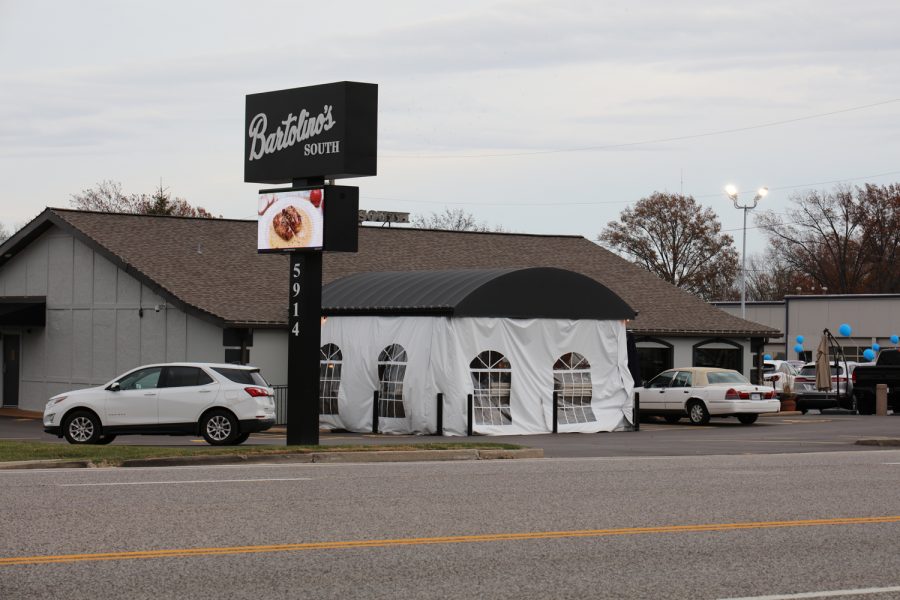A St. Louis County judge ruled Nov. 20 against a lawsuit filed by Bartolino’s South and about 40 other restaurants challenging an indoor dining ban ordered by County Executive Sam Page, the latest in a string of wins the county has had in court defending its various public-health orders.
The Missouri Restaurant Association filed a lawsuit Nov. 18 challenging the indoor dining ban that went into effect at 12:01 a.m. Nov. 17 alongside a new stay-at-home advisory that encourages residents to stay at home unless it is absolutely necessary to leave due to a surge of COVID-19 hospitalizations that has overwhelmed the region’s health care system.
The public-health restrictions, ordered by Page but officially coming down through the county Department of Public Health, are aimed at bringing down cases of the coronavirus. Page also announced a stricter mask mandate as part of the orders.
Restaurants can still open for curbside pickup and takeout under the new stay-at-home mandate, which is slated to last through Dec. 17.
Associate St. Louis County Circuit Judge John R. Lasater, who was appointed by former Gov. Eric Greitens, ruled against the restaurants’ bid for a temporary restraining order that would have halted the dining ban.
South County Italian restaurant Bartolino’s South, located on South Lindbergh Boulevard in Green Park, has been the most vocal restaurant defying the restrictions, almost immediately threatening on Facebook to file a lawsuit and encouraging other family-owned restaurants to join it. The restaurant remained open after the restrictions went into effect, receiving two official notices of violation from St. Louis County along with several others involved in the suit.
St. Louis County restaurants were closed to indoor dining for two months in the spring during Page’s previous stay-at-home order that shut down all businesses deemed nonessential.
Multiple lawsuits were filed against Page and the county challenging those spring shutdowns, but all of them failed in court as judges ruled that the county has broad powers to issue public-health mandates during a pandemic. A federal judge ruled in a case filed by House of Pain Gym in Maryland Heights that the county has sweeping powers to shut down businesses during a public-health crisis, or even mandate that some types of businesses can stay open while others have to close. Another lawsuit filed asking for churches to be allowed to open without gathering limits was thrown out of federal court for lack of standing, although the U.S. Supreme Court ruled against some of those types of limits last week.
“We’ve been through this before over the last eight months and we know how all of these legal actions will work out,” Page said Nov. 18, before the lawsuit was filed. “For those who are defying the public-health orders, I hope that you will think about the safety of your employees and your patrons and the people who come to your businesses. I don’t know why anyone would want to eat at a restaurant who doesn’t follow health orders. By going against public-health experts, you’re telling our public-health workers that you don’t appreciate or respect the sacrifices that they are making to keep you safe or your family safe. … We shouldn’t be asking ourselves, ‘What can I get away with?’”
Bartolino’s South posted on its Facebook page Nov. 14, “We, and other Family owned Restaurants in St. Louis County are not going quietly! … Sam Page’s overreach with the arbitrary closure of indoor dining for county restaurants and bars is irresponsible. The final weeks of the year are consistently one of the most important times of the year for restaurant employees. Our employees are FAMILY, and Sam Page took a direct uppercut towards their livelihood. We have partnered with other local county restaurants to file a lawsuit against Sam Page, and plan to REMAIN OPEN for SAFE Indoor Dining.”
The Gianino and Syberg’s restaurant families joined the lawsuit, as did the backers of The Shack and Fitz’s South County. The South County restaurants listed as plaintiffs include Bartolino’s, Gianino’s in Oakville, Helen Fitzgerald’s in Sunset Hills and Sam’s Steakhouse in Affton.
One of the lawyers listed on the lawsuit as representing the restaurant is Rep. Mary Elizabeth Coleman, R-Arnold, who represents Arnold and part of South County in the state Legislature and got the Jefferson County Health Department to back down on issuing a mask mandate in September by threatening to file a lawsuit.
Unlike the indoor dining ban earlier in the year, St. Louis city did not ban indoor dining, and so far neither have surrounding counties although their residents have contributed to the record surge of hospitalizations that spurred the dining ban. Since St. Louis city is its own county separate from St. Louis County, Bartolino’s has two restaurants in the city of St. Louis that are staying open, Bartolino’s Osteria and Chris’ Pancakes.
After Lasater ruled against the restaurants, the Missouri Restaurant Association said that obtaining a temporary restraining order is an “uphill battle,” and that the day in court was just the first step in a legal battle.
CEO Bob Bonney said in a statement: “The fact that the judge denied the restaurants’ request for a TRO does not mean he ruled against the restaurants on the merits of their claim, but it does mean that the shut-down order remains in effect while the case proceeds. The restaurants have not lost the case and no judge has declared that any of the medical director’s unilateral orders should have the force of law. A decision on that issue will happen later.”
Earlier, Bonney had said he thought the latest shutdown would result in the permanent closure of restaurants. At least 30 restaurants have shut down in St. Louis County due to the COVID-19 pandemic.
The restaurants have said they’re being unfairly singled out in the latest restrictions since other businesses like retail can stay open at 25-percent capacity. But a peerreviewed Stanford University study published in the scientific journal Nature in November examined cell-phone mobility data from 10 cities this summer and found that “restaurants were by far the riskiest places” to spread COVID-19. A study from the Centers for Disease Control found that those who tested positive for COVID-19 had been twice as likely to have eaten in a restaurant than those who had not. Another study from China linked an outbreak to the indoor circulation system in a restaurant.
As a new virus, not everything is known about how the novel coronavirus operates. But Page, a medical doctor, noted that “it’s an aerosol and it moves about in a room,” and diners are not wearing masks while eating. “We know from our public-health experts that sitting close together without a mask and a group when 1 in 25 or 1 in 50 people are walking around with this virus without symptoms” is a risk. “I respect and understand that it’s not all coming from restaurants and bars. Our restaurants and bars are not the worst, but we know that they are part of it.”
The statewide restaurant association said it would join the legal fight because the restrictions had been “issued without due process or an opportunity for public comment as would have been the case if the matter had been brought before the County Council.”
That legal question from the lawsuit is still open, with no hearings scheduled at press time. It’s an ironic legal argument to make against Page, who chaired the council in 2017 when the council filed a lawsuit against then-County Executive Steve Stenger alleging that he was abusing his executive powers at the expense of separation of powers.
The council prevailed in that lawsuit. But that court case involved powers dictated by the county Charter, and Page’s power to issue mandates through the health department comes from state law. It’s been an issue explored by 6th District Councilman Ernie Trakas, R-Oakville, who along with the other two GOP council members filed affidavits supporting the restaurants’ legal case. The night the ban went into effect and Bartolino’s opened anyway, 3rd District Councilman Tim Fitch, R-Fenton, and Jefferson County Sheriff Dave Marshak each separately posted their apparent visits there to Twitter.
The lawsuit alleges that Page “unilaterally” went around the council to “avoid democratic channels of legislation.” Page and other county officials “do not have legal authority to issue these laws,” the attorneys argued, adding, “This is an extremely dangerous precedent.”
Page’s current orders are issued through health department interim co-director Dr. Emily Doucette, who the restaurants are suing by name. Page is able to issue the orders through Doucette after declaring a state of emergency in March, which is ongoing. The restaurants’ attorneys argue in court filings that Page had no legal authority to issue a state of emergency because a pandemic is not included as one of the “natural causes” or disasters specifically outlined in the county Charter.
Judges in the previous court cases said state law grants that power to local health departments. However, the restaurants are arguing that county law should apply that says that health officials can implement laws only with approval of the council. Rep. David Gregory, R-Sunset Hills, said he would file legislation to give state lawmakers some power over local health orders like Page’s, a move he said was based on demand from “thousands” of his constituents. He said that his legislation would be a top priority of the incoming Republican caucus, which has resisted wearing masks in the state Capitol.
Read the lawsuit below:
